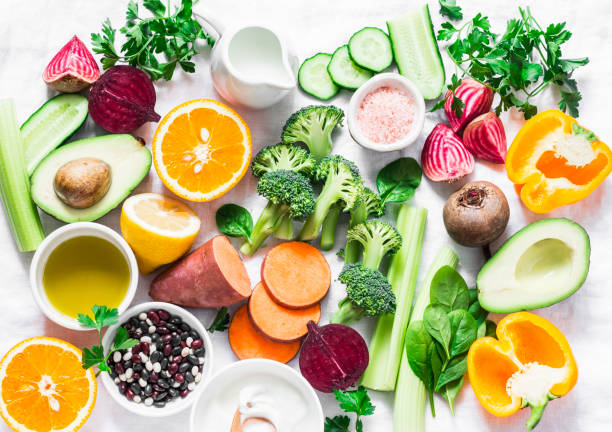Which vitamins in which foods? A list of our foods with vitamin content. Because if you don’t eat enough vitamins, you will soon suffer from deficiency symptoms. We will therefore show you which foods you should eat in order to be able to give your body all the important vitamins.
Vitamins in fruits and vegetables
Basically, all types of fruit and vegetables contain a good amount of vital substances. At least 2.5 cups of vegetables and 2 cups of fruit should be consumed daily. In order to preserve as many vitamins as possible, it is advisable to cook the vegetables carefully and, if possible, not to keep them warm for long. It is also beneficial to buy organic fruits and vegetables to get the full benefit. Here are the top foods in this category:

Paprika: The paprika has the highest content of vitamin C (138mg/100g!) and vitamin E of all types of vegetables. Just 85 grams of this vegetable is enough to cover the daily vitamin C content of an adult.
Sweet potato: This delicious vegetable not only scores with its taste, but also with its high content of vitamin A. That’s not all, the sweet potato also contains numerous other vitamins and trace elements.
Rosehip: It is an amazing fruit and surpasses all other fruits with its content of vitamins C, A, and E. It only takes nine grams of rose hips and your daily vitamin C requirement is covered.
Vitamins in animal foods
Meat, fish, cheese, yogurt, and milk are all important sources of B-complex vitamins. Vegetarians and vegans in particular often suffer from low levels of vitamin B12. In such cases, supplements should be taken to help or meat and fish should be integrated into everyday life. Also in this food category, there are some representatives that you absolutely must know about:
Eggs: Egg yolks contain 147 micrograms per 100 grams, making them a top representative of this fat-soluble vitamin. Eggs also provide high levels of pantothenic acid (1.6mg/100g), folic acid, and cobalamin or vitamin B12.
Liver: It doesn’t matter if you choose veal liver, chicken liver, or cod liver oil, these foods are all very high in vitamins. Of particular note are the 60 micrograms of vitamin B12 per 100 grams of calf’s liver. No other food has such an amount of vitamin B12.
Milk fats: Dairy products meet the need for vitamin A in particular, but they also contain vitamins D and B12. Cheese, yogurt, and whole milk are products with healthy milk fats.
Plant-based foods (excluding fruits and vegetables)
Vegetable foods such as legumes or grains are just as important for humans as meat, fish, and dairy products. Therefore, also integrate the following top representatives into your menu:

Brewer’s yeast/yeast flakes: Seasoning yeast contains high levels of various vitamins of the B6 complex, vitamin B3, AND b1. Yeast can easily be incorporated into many menus.
Hazelnuts: The healthy nuts are not only delicious but also contain almost 30mg of vitamin E per 100 grams of the little bundle of energy. So feel free to grab it!
Vitamins for athletes
If you do sports, you should pay even more attention to your vitamin requirements. People who eat a varied diet with natural products need not fear developing a deficiency symptom.
Vegetarians and vegans should listen to their bodies and take supplements if necessary.
